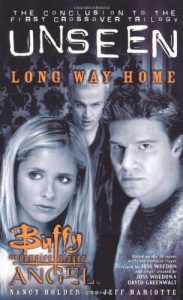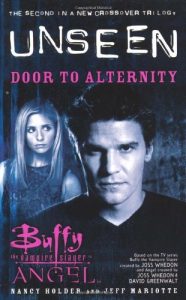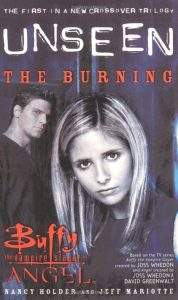 In retrospect, I’m glad I didn’t figure out how deeply flawed the final volume of that Buffy/Angel crossover series was until the last 50 pages or so. Because, I have this habit of not letting things go, however terrible, until I’m through with them, and it would have sucked to bitch to myself constantly for 300 pages instead of only 50. Seriously. There was this bowl of queso at lunch yesterday that tasted truly awful, but I kept re-tasting it because part of it reminded me of some other taste, and I couldn’t quite put my, er, tongue on it. Meanwhile, my co-diner was actually throwing up due to the chemical poisoning from whatever plastic thing had melted into the queso mix. I’d like to think that if she’d been throwing up before I kept re-tasting, that would have stopped me. I really, really would love to think that.
In retrospect, I’m glad I didn’t figure out how deeply flawed the final volume of that Buffy/Angel crossover series was until the last 50 pages or so. Because, I have this habit of not letting things go, however terrible, until I’m through with them, and it would have sucked to bitch to myself constantly for 300 pages instead of only 50. Seriously. There was this bowl of queso at lunch yesterday that tasted truly awful, but I kept re-tasting it because part of it reminded me of some other taste, and I couldn’t quite put my, er, tongue on it. Meanwhile, my co-diner was actually throwing up due to the chemical poisoning from whatever plastic thing had melted into the queso mix. I’d like to think that if she’d been throwing up before I kept re-tasting, that would have stopped me. I really, really would love to think that.
Sadly, that story was more metaphor than digression. There are good Buffy books out there, as much as any randomly farmed out novelisation franchise can have quality. This trilogy, as I’ve said basically from start to finish, does not reach that low watermark. The banter and adventure is, y’know, fine. The storyline, though, got just about as bad as it could have. The thing I figured out 50 pages from the end is that they had no possible way to satisfactorily conclude the story. I was wrong in that, and I admit it; they wrapped up without taking any cheap shortcuts as I expected. No, I spotted the real problem after the fact, which was that it should have been those 50 pages all along, and that the 250 previous pages were nothing but an artificially induced delay to make it long enough to be a trilogy, since that’s what the authors had promised to their bookfarm foreman.
My point being, Long Way Home is easily the worst-plotted book of a pretty bad trilogy, in which the first volume failed to deliver on even a freaking crossover. There’s a Batman book I read in my middle youth, in which someone decided to write a polemic decrying the child sex trade (a topic which until that moment had been mostly the subject of widespread praise, I’m sure) and thought that it might be fun to have Batman involved. This trilogy is like that, except about urban gang warfare or possibly the Soviet bloc. Buffy and Angel are about as poorly shoehorned into the plot here as Batman was in The Ultimate Evil. Credit where it’s due, though: regardless of how bad a fit Batman was in that story, at least the story itself made a lick of sense. This one, not so much.
 If you’re in any way interesting, you don’t remember that
If you’re in any way interesting, you don’t remember that  Over the past week, I’ve been putting in some low-rent reading time with the first book of Unseen, a Buffy/Angel crossover trilogy set during the summer between the fourth and fifth seasons of
Over the past week, I’ve been putting in some low-rent reading time with the first book of Unseen, a Buffy/Angel crossover trilogy set during the summer between the fourth and fifth seasons of